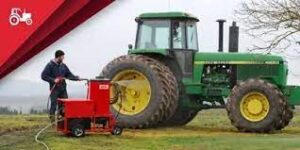Power Washing Farm Equipment
Running a farm is a stressful operation to maintain. Farmers depend on their equipment to run smoothly and not malfunction in a time of need. Preventative maintenance is key in reinforcing this, as anyone operating equipment of any kind will tell you. If you are not keeping your machinery clean, you are sacrificing the longevity of your equipment and the initial investment in it.
WHY KEEP FARM EQUIPMENT CLEAN?
Agricultural machinery, from tractors to power tools, is at its best when it’s free of gunk. Dirt, mud, grass, plant matter, grease, and more build up over time and usage throughout the land. The longer that build up cements on your equipment, the harder it is to remove the bigger threat it poses to the service life of your machine. It can lead to rust damage when water gets trapped in areas that would normally allow for it to flow through without issue. It can also lead to the breakdown of the moving parts of your machine.
HOW OFTEN SHOULD AGRICULTURAL MACHINERY GET POWER WASHED?
Depending on how often your farm equipment gets used, you may find it necessary to wash it periodically or after every use. During planting season, if you find yourself working quite a bit in the rain, mud starts to stick to your machine pretty quickly. When harvest season rolls around, plant matter gets added to the mix. Regardless of the season, grease buildup is never a good thing when it comes to the life of your farm equipment. After using your machine, give it a quick look. If you can see quite a bit of buildup, it’s time for a power washing.
WHERE TO WASH TRACTORS
Making sure you have a designating wash area for your machines is always step one. Any grease, oil, or other potentially harmful runoff should be safely disposed of so that the land and water is safe. Limiting your liability starts with proper preparation!
WASHING TECHNIQUES
When your tractor or power tools are packed with gunk and grime or have quite a bit of grease buildup on them, it’s a good idea to start with hot water. This helps start the breakdown process, making it much easier for deep cleaning to begin. Start at the top of your machine and work your way down, so runoff continues to run away from the cleaner areas. Pay special attention to nooks and crannies, because that’s where you’ll probably see extra clumps of mud and gunk. Once the hot water seems to have done all it can do, it’s time to introduce the detergent.
DETERGENT AND POWER WASHERS
Adding detergent to pressure washers can help move dirt and grime off of your machine more swiftly. It’s important to note that you should use low pressure during this step, so that the detergent has time to stick around to do its job and not get washed away. You’ll want to let the soap sit on the machine for a few minutes to work through any of the mud, dirt, etc. Follow the specific instructions that came with your pressure washer when adding detergent, so you know the exact amount needed for the task at hand.
FIND PROBLEMS WITH TRACTORS BEFORE IT’S TOO LATE
Another bonus of regularly cleaning your farm machinery is that you’ll be able to detect problems before it’s too late. You may find a leak that you hadn’t yet noticed or a part starting to rust. It may be a loose screw that could cause a major issue down the road had you not caught it early. The sooner you catch a potential malfunction, the sooner you can address it. This can mean that the service life of your equipment can be extended and your investment protected.

